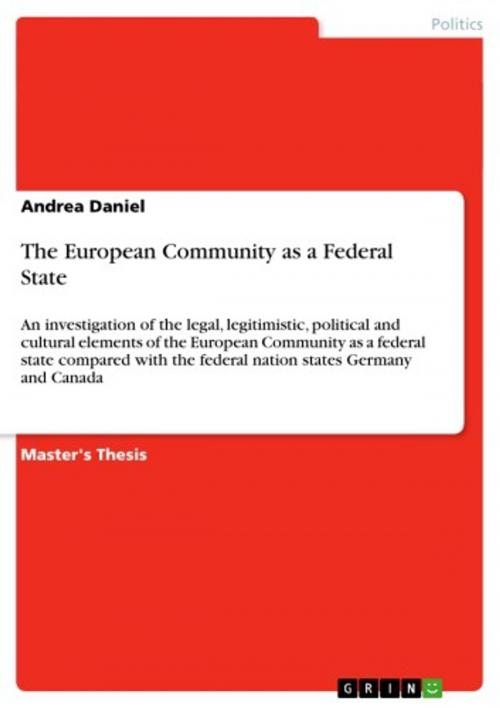The European Community as a Federal State
An investigation of the legal, legitimistic, political and cultural elements of the European Community as a federal state compared with the federal nation states Germany and Canada
Nonfiction, Social & Cultural Studies, Political Science| Author: | Andrea Daniel | ISBN: | 9783640433889 |
| Publisher: | GRIN Publishing | Publication: | September 28, 2009 |
| Imprint: | GRIN Publishing | Language: | English |
| Author: | Andrea Daniel |
| ISBN: | 9783640433889 |
| Publisher: | GRIN Publishing |
| Publication: | September 28, 2009 |
| Imprint: | GRIN Publishing |
| Language: | English |
Master's Thesis from the year 2009 in the subject Politics - International Politics - Topic: European Union, grade: A-Grade with Distinction, South Bank University London (Faculty of Art and Human Sciences), language: English, abstract: The thesis of this work is that the European Community is a self-standing federal state with inadequate political power, as the Member States keep essential core competences in the fields of Foreign, Defence and Monetary Policy to themselves or limit them to the intergovernmental 'pillars' of the European Union. Although it is not yet adequately filled with political competences, the structural shell of the European Community is suitable to fulfil all tasks that should, in the best interest of all Member States, be fulfilled on the federal level. Today's European Community has developed the three elements of a state (Territory, Original Power and Permanent Population). The European Community has outgrown the former restrictions and limitations of e.g. the direct effectiveness of the legal order, the 'originality' and quality of legisla-tive, executive and judiciary power and of the self-standing quality of the Citizenship of the Union. A comparison with the structural, legal and legitimistic elements of the German and the Canadian federations shows that the Community's system has adopted very similar, sometimes even almost identical, features. The state quality, which is regarded as a 'given' when it comes to Germany or Canada, should there-fore no longer be denied to the Community. Still not vanished but very much reduced is the Community's traditional 'democratic deficit'. The competences of the Euro-pean Parliament have been significantly expanded and the Community also found other ways of civil society's participation. Besides that it adopted the doctrine of 'checks and balances' of separated state powers. The transfer of political powers and competences has, however, not kept pace with the structural development. Es-sential areas of Foreign, Defence and Monetary Policy are still a prerogative of the Member States. As a result the European Federal State cannot use its potential, e.g. its enormous 'bargaining power' on the international stage or the full capacity of the internal market's and single currency's economic power to produce economical and political surplus beneficial for all Member States. Therefore the key competences should be transferred to the Community's supreme legislative competence under full responsibility of the European Parliament. This process should not be hindered by the frequently mentioned lack of inner cohesion in the Community due to a lack of 'cultural identity'.
Master's Thesis from the year 2009 in the subject Politics - International Politics - Topic: European Union, grade: A-Grade with Distinction, South Bank University London (Faculty of Art and Human Sciences), language: English, abstract: The thesis of this work is that the European Community is a self-standing federal state with inadequate political power, as the Member States keep essential core competences in the fields of Foreign, Defence and Monetary Policy to themselves or limit them to the intergovernmental 'pillars' of the European Union. Although it is not yet adequately filled with political competences, the structural shell of the European Community is suitable to fulfil all tasks that should, in the best interest of all Member States, be fulfilled on the federal level. Today's European Community has developed the three elements of a state (Territory, Original Power and Permanent Population). The European Community has outgrown the former restrictions and limitations of e.g. the direct effectiveness of the legal order, the 'originality' and quality of legisla-tive, executive and judiciary power and of the self-standing quality of the Citizenship of the Union. A comparison with the structural, legal and legitimistic elements of the German and the Canadian federations shows that the Community's system has adopted very similar, sometimes even almost identical, features. The state quality, which is regarded as a 'given' when it comes to Germany or Canada, should there-fore no longer be denied to the Community. Still not vanished but very much reduced is the Community's traditional 'democratic deficit'. The competences of the Euro-pean Parliament have been significantly expanded and the Community also found other ways of civil society's participation. Besides that it adopted the doctrine of 'checks and balances' of separated state powers. The transfer of political powers and competences has, however, not kept pace with the structural development. Es-sential areas of Foreign, Defence and Monetary Policy are still a prerogative of the Member States. As a result the European Federal State cannot use its potential, e.g. its enormous 'bargaining power' on the international stage or the full capacity of the internal market's and single currency's economic power to produce economical and political surplus beneficial for all Member States. Therefore the key competences should be transferred to the Community's supreme legislative competence under full responsibility of the European Parliament. This process should not be hindered by the frequently mentioned lack of inner cohesion in the Community due to a lack of 'cultural identity'.















